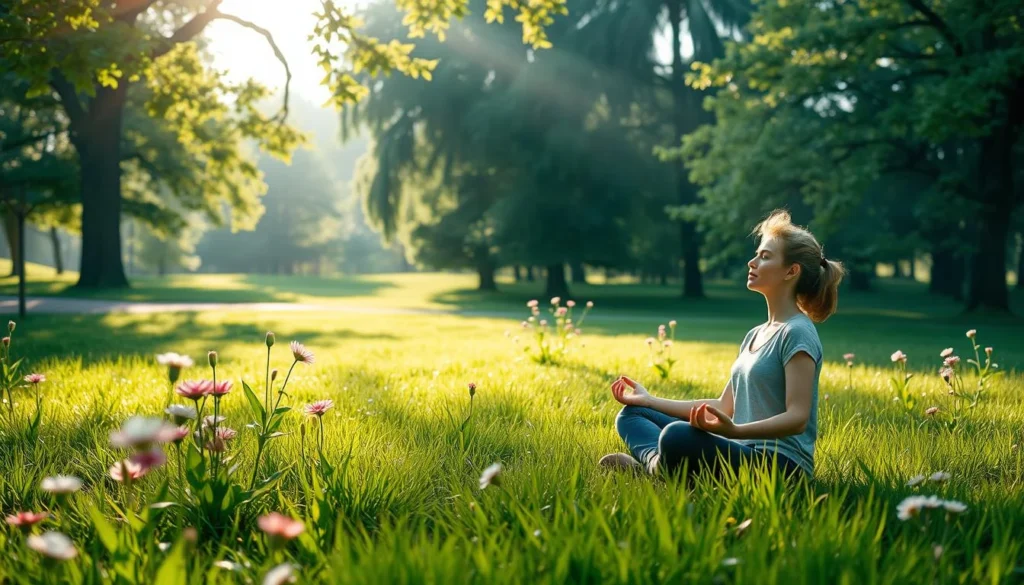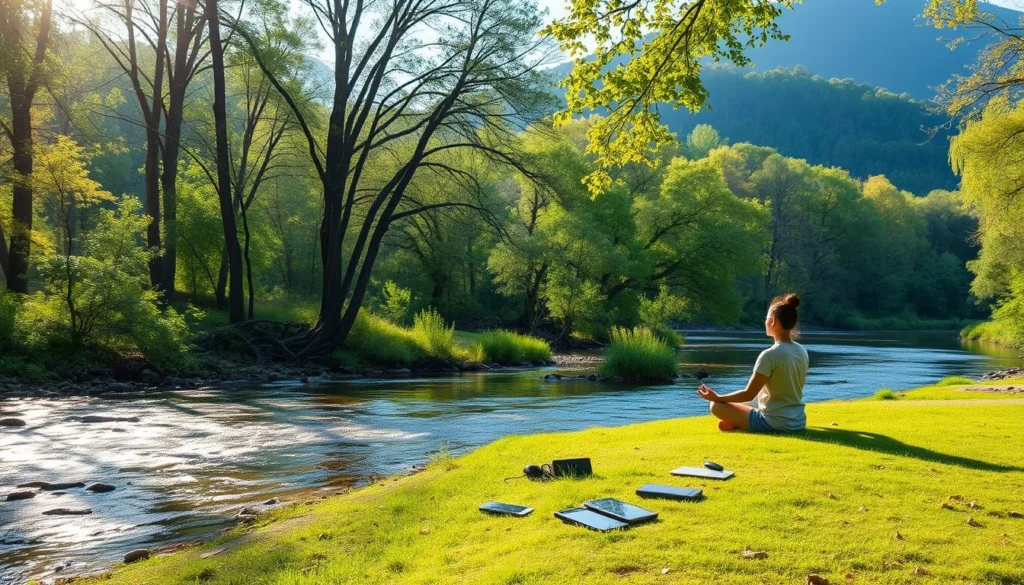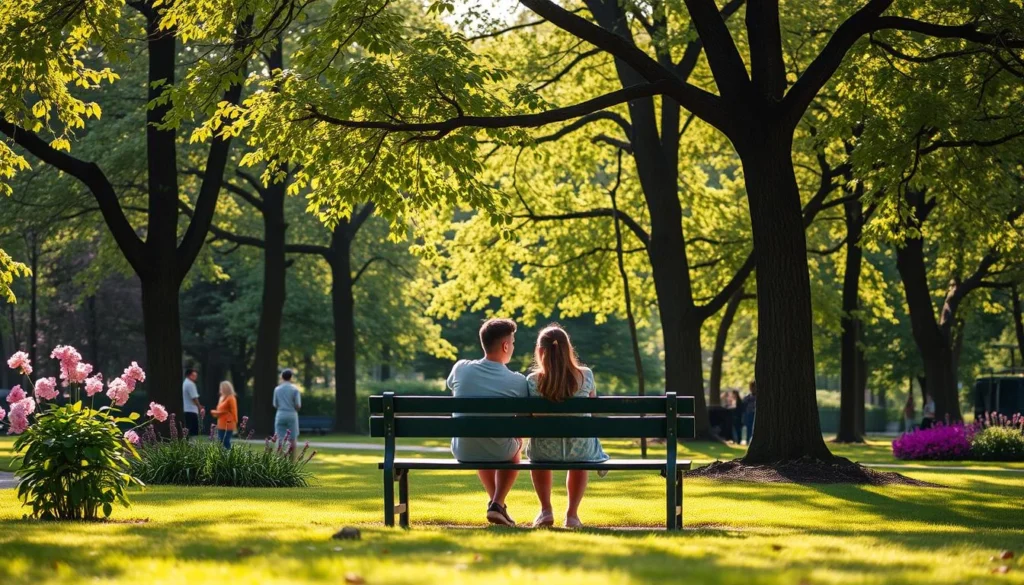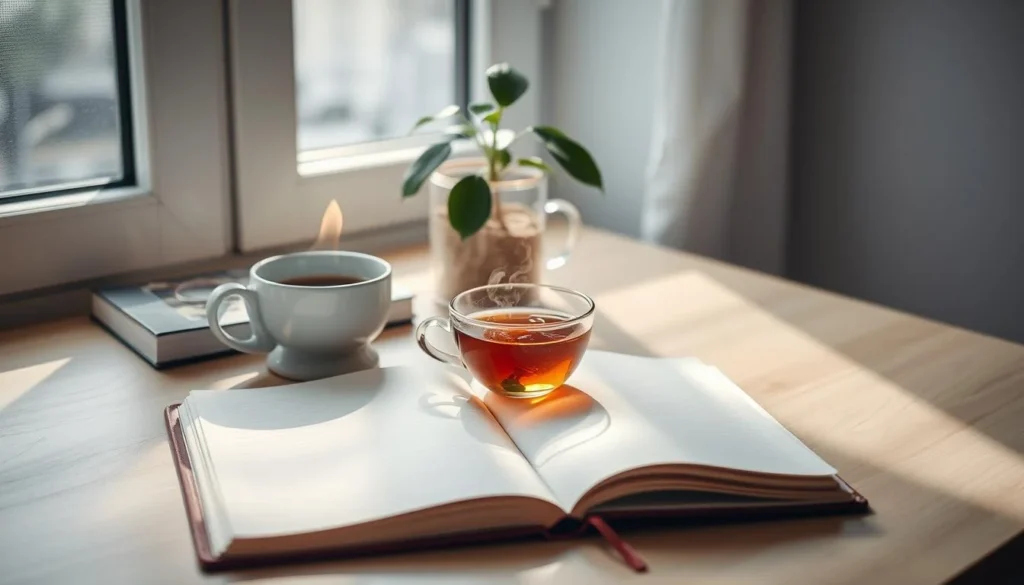Did you know 78% of Americans feel they’re always rushing? This shows how fast our lives are moving. We’re so focused on being productive that we forget to enjoy the little things. But, there’s a growing movement that says it’s time to slow down and focus on ourselves.
In today’s world, slowing down is a bold move. It’s about finding balance in a society that values being busy. By slowing down, we can find more joy, make deeper connections, and feel better overall. This article will share ten easy tips to help you slow down and enjoy life more.
We’ll look at ways to detox from digital overload and eat more mindfully. You’ll learn how to be more grateful, set healthy limits, and focus on what’s important. These tips aren’t about doing less. They’re about living more fully and on purpose.
Are you ready to fight the rush and take back your time? Let’s see how slowing down can make your life richer and more fulfilling. Whether you want a better work-life balance or just to enjoy life more, these tips will help you find peace and balance.
Key Takeaways
- Slowing down can lead to increased happiness and life satisfaction
- Mindfulness practices improve mental health and reduce stress
- Disconnecting from technology enhances real-world connections
- Single-tasking boosts productivity and focus
- Regular breaks and self-care are essential for overall well-being
- Setting boundaries helps protect your time and energy
- Appreciating simple pleasures can significantly boost life enjoyment
Understanding the Modern Pace of Life
Life today moves at a frantic pace. The push for productivity and achievement has left many feeling overwhelmed. This fast pace, though productive, often hinders personal growth and emotional well-being.
The Paradox of Time-Saving Technology
Ironically, tools meant to save time often take it away. Technology has made tasks easier but also mixed work and home life. A study found workweeks have grown with smartphones, while leisure time has decreased.
Impact of Fast-Paced Living on Well-being
The rush of modern life affects our happiness and stress management. Many feel restless and anxious due to the pace. This constant hurry can cause burnout, harming mental and physical health.
Signs You’re Moving Too Fast
It’s important to know when life’s pace is too much. Signs include constant multitasking, neglecting self-care, and feeling overwhelmed. If you’re experiencing these, it’s time to slow down and focus on personal growth.
| Aspect | 40 Years Ago | Today |
|---|---|---|
| Workday Length | Shorter | Longer |
| Leisure Time | More | Less |
| Work-Life Boundaries | Clear | Blurred |
| Information Exposure | Limited | Overwhelming |
Understanding these changes helps us make choices to slow down. This leads to greater happiness and better stress management.
Why Slowing Down is Essential for Personal Growth

In today’s fast world, slowing down is key for personal growth. It lets us step back, reflect, and focus on what’s important. By pausing, we make room for self-reflection and emotional health.
Research finds 90% of people feel always rushed, missing out on life’s joys. This fast pace causes chronic stress and burnout. Slowing down can change our mental state and improve our life quality.
Embracing a slower pace helps us tap into our inner wisdom. It improves our decision-making and deepens relationships. It’s not about doing less, but being more present in every moment.
“The quieter you become, the more you can hear.” – Ram Dass
Here are some ways to slow down and grow personally:
- Set boundaries on commitments
- Practice mindfulness daily
- Take regular breaks to recharge
- Prioritize self-care activities
- Be fully present in conversations
By using these strategies, we can adopt a slower mindset. This boosts happiness and lowers stress. It helps us enjoy life’s small joys and focus on what’s truly important for our growth and emotional health.
| Activity | Benefit | Time Investment |
|---|---|---|
| Daily Meditation | Improved Mindfulness | 15-20 minutes |
| Mindful Eating | Enhanced Self-Reflection | Each meal |
| Tech-Free Hour | Reduced Stress | 1 hour daily |
| Nature Walk | Increased Well-being | 30 minutes |
The Connection Between Mindfulness and Slower Living
Mindfulness and slower living are closely linked, leading to better emotional health. Studies show these practices can change how we see time and life’s quality.
Benefits of Present Moment Awareness
Mindfulness research is revealing. A 2013 study found that Romanian students who meditated felt time passing slower. This effect was also seen in a 2014 study with long-term meditators.
Mindfulness Techniques for Daily Life
Adding mindfulness to your day can be easy and powerful. Here are some ways to do it:
- Slow walking: Focus on each step
- Mindful eating: Enjoy every bite
- Focused breathing: Take deep, mindful breaths
These methods not only slow you down but also deepen your connection to the world. A Mindful.org survey showed that 78% of slow-living fans felt less stressed.
Creating Space for Reflection
Reflection is vital for gratitude and emotional health. Journaling or quiet time can reveal deep insights. A study in the Journal of Positive Psychology found a 15% boost in life satisfaction from reflection.
“Slowness in daily activities can contribute to a more mindful and fulfilling experience of life.”
By embracing mindfulness and slower living, you’re not just slowing down. You’re changing your life for the better.
How to Enjoy Life More Through Intentional Living

Intentional living helps you enjoy life more. It means making choices that match your values and goals. This way, you find more joy in everyday moments.
Positive thinking is key in intentional living. Research shows that 80% of it is about picking priorities and organizing life around them. This mindset change can make life more rewarding.
Gratitude is also crucial. Appreciating the small things can increase happiness. Here are ways to add gratitude to your day:
- Keep a gratitude journal
- Express thanks to others
- Savor pleasant moments
Self-reflection is important for staying true to yourself. Regular self-checks, making up 70% of intentional living, keep you on the right path. Set aside time each week to review your progress and adjust as needed.
“The key to intentional living is making small, manageable plans to align daily activities with desired outcomes.”
To enjoy life more, focus on creating meaningful experiences. This could be starting a peaceful morning routine or finding happiness in simple tasks like making your favorite coffee.
| Aspect of Intentional Living | Percentage of Impact |
|---|---|
| Choosing priorities | 80% |
| Regular self-reflection | 70% |
| Setting clear goals | 60% |
| Continuous adjustment | 65% |
Embracing intentional living leads to a life full of purpose, joy, and gratitude. It’s a journey of ongoing growth and self-discovery.
Digital Detox: Breaking Free from Technology’s Grip

In today’s world, technology controls our lives. People spend over two hours a day on social media. Work emails can also take up a lot of time. This can make it hard to manage stress and balance work and life.
Setting Healthy Boundaries with Devices
Start by setting limits on your devices. Make times when you don’t use tech, like during meals or with family. Use your phone’s tools to track and limit your screen time. This can help you take care of yourself better and be more productive.
Creating Tech-Free Zones and Times
Make some areas in your home tech-free. Your bedroom should be a place for rest. Try a “digital sunset” – turn off all devices at the same time each day. This can help you sleep better and feel better overall.
Alternatives to Digital Entertainment
Find fun in things that don’t involve screens. Reading, walking outside, or doing creative things can be great. These activities are not only fun but also help you live a more balanced life.
| Digital Activity | Offline Alternative | Benefits |
|---|---|---|
| Social Media Browsing | Reading a Book | Improved focus, reduced eye strain |
| Mobile Gaming | Outdoor Exercise | Physical fitness, vitamin D exposure |
| Netflix Binge | Cooking a Meal | Skill development, mindful eating |
By unplugging, we can free ourselves from technology’s hold. This digital detox helps us manage stress better, balance work and life, and take care of ourselves.
Cultivating Meaningful Relationships in a Fast World

In today’s fast world, it’s vital to build deep connections for our emotional well-being and happiness. Studies show that good relationships lead to a happier life. To create strong bonds, we must slow down and be fully present.
Meeting face-to-face is essential for forming strong emotional ties. A survey by a leading relationship institute found that people who meet in person feel closer to others. This shows the need to balance our online and offline lives.
Active listening is crucial for deepening relationships. Research shows that those who listen well form stronger emotional bonds. Try to spend 10 minutes twice a day fully engaging with loved ones, without distractions.
“The quality of our relationships determines the quality of our lives.” – Esther Perel
Small gestures can have a big impact. Spend 3 minutes on personalized birthday wishes or take 30 seconds for spontaneous check-ins. These acts strengthen bonds and show you care. It’s not about having many friends, but the depth of your connections that matters.
Showing gratitude is another powerful way to strengthen relationships. Take time to thank others for their positive impact on your life. This practice not only improves your connections but also boosts your happiness and work-life balance.
Finding Joy in Simple Daily Pleasures
Life’s beauty often lies in the little things. By practicing mindfulness and gratitude, we can enjoy life more through everyday experiences. Let’s explore how to savor these moments and create a more fulfilling daily routine.
Mindful Eating and Food Appreciation
Slow down and savor each bite. Take time to appreciate the flavors, textures, and aromas of your meals. This practice not only enhances your eating experience but also promotes better digestion and satisfaction.
Connecting with Nature
Embrace the outdoors to boost your well-being. Try these simple nature-based activities:
- Take a daily sunset walk
- Water plants and watch them grow
- Sit in a park and observe wildlife
Creating Peaceful Morning Routines
Start your day with intention. A calm morning sets a positive tone for the hours ahead. Consider incorporating these elements into your routine:
| Activity | Benefit |
|---|---|
| Sipping ginger chai | Warms the body and calms the mind |
| Writing gratitude notes | Fosters positivity and appreciation |
| Gentle stretching | Awakens the body and increases flexibility |
Remember, finding joy in simple pleasures is a practice. By cultivating awareness and gratitude for these moments, you’ll discover a richer, more satisfying life experience.
The Art of Single-Tasking for Better Focus

In today’s fast world, single-tasking is a big help for managing stress and growing personally. Studies prove it’s quicker and more effective than trying to do many things at once. By focusing on one task, we can do better work and be more productive.
Many people try to do many things at once because they feel overwhelmed or bored. But our brains aren’t made for it. Switching tasks makes us tired and makes everything harder. Learning to focus on one thing at a time can make us much more efficient and improve our work quality.
To get good at single-tasking:
- Slowly increase the time you can focus without distractions
- Make special places for deep work
- Only have one browser tab open
- Find and cut down on distractions
Single-tasking is key for deep work, which needs your full attention. It’s important for moving up in your career and keeping a good balance between work and life. By practicing single-tasking, we can keep our brains healthy, feel better mentally, and do better in both our personal and work lives.
“Single-tasking helps the brain learn to stay focused for longer periods.”
Learn the art of single-tasking to improve your focus, lower stress, and grow personally. It’s a great way to handle our fast world while keeping balance and doing well in our work and personal lives.
Self-Care Practices for a Balanced Life
Self-care is key in our busy world. It’s about doing things that make you feel good physically, mentally, and emotionally. Let’s look at some self-care practices that can help you handle stress and make your life better.
Physical Well-being Activities
Keeping your body healthy is important. This includes regular exercise, eating right, and getting enough sleep. Here are some activities to consider:
- Daily walks or jogs
- Yoga or stretching routines
- Balanced meals with plenty of fruits and vegetables
- Consistent sleep schedule (7-9 hours per night)
Mental Health Practices
It’s also important to take care of your mind. Doing things that make you think and relax can really help your mental health. Try these:
- Meditation or mindfulness exercises
- Reading books or learning new skills
- Journaling your thoughts and feelings
- Engaging in creative hobbies
Emotional Balance Techniques
Keeping your emotions in check is crucial for managing stress and staying strong. Here are some techniques to try:
- Practice gratitude by listing things you’re thankful for
- Connect with loved ones regularly
- Seek professional help when needed
- Engage in activities that bring you joy
Remember, taking care of yourself isn’t selfish. It’s necessary for your health and happiness. By focusing on these practices, you can improve your emotional well-being and live a more balanced life.
| Self-Care Type | Benefits | Examples |
|---|---|---|
| Physical | Improved energy, better sleep | Exercise, healthy eating |
| Mental | Reduced stress, clearer thinking | Meditation, learning new skills |
| Emotional | Better mood, increased resilience | Journaling, therapy |
Creating Boundaries to Protect Your Time
Setting boundaries is crucial for work-life balance and stress management. It means learning to say “no” and focusing on what’s important. By setting clear limits, you safeguard your time and energy for personal growth and well-being.
Research shows boundaries are powerful in our lives. A study found that 80% of people felt less stressed after setting limits. This shows how important it is to have personal guidelines for a healthier life.
In the workplace, boundaries are vital. Healthcare workers who set limits with colleagues and patients saw a 60% drop in burnout. They also felt more job satisfaction. This shows protecting your time can improve work performance and happiness.
| Boundary Setting Impact | Percentage Improvement |
|---|---|
| Reduced Stress Levels | 80% |
| Decreased Burnout in Healthcare | 60% |
| Increased Productivity in Tech | 70% |
In the fast-paced tech world, boundaries also matter. 70% of tech workers felt more productive after saying “no” to tasks not fitting their skills or values. This shows setting limits can increase your effectiveness and job satisfaction.
Creating boundaries isn’t selfish. It’s essential for stress management and personal growth. By protecting your time, you’re investing in your well-being. This sets the stage for a more balanced and fulfilling life.
Building a Sustainable Slower Lifestyle
Creating a sustainable slower lifestyle is crucial for personal growth and happiness. It’s about making lasting changes, not quick fixes. Think of your grandparents’ time when they had fewer appliances. Now, we have lots of technology to save time, but we still feel rushed.
To start a sustainable slower lifestyle, take small steps. Walk instead of driving for short trips. Live in a smaller house and buy less. Celebrate without spending too much. Eat slowly and enjoy your meals. These small changes can make a big difference in your well-being.
Think about the environmental impact of your choices. Fast fashion is responsible for 10% of global carbon emissions. By buying less and choosing quality, you save money and help the planet.
“The secret of happiness, you see, is not found in seeking more, but in developing the capacity to enjoy less.” – Socrates
Focus on creating value, not just consuming. This can lead to meaningful work and deeper relationships. Spend time in nature, talk face-to-face, and reduce tech use. These actions promote personal growth and happiness.
Building a slower lifestyle is a journey. Be patient as you make changes. Over time, you’ll become more present, and fulfilled, and enjoy life’s simple joys.
Conclusion
Slowing down to enjoy life more is a great way to improve our well-being. The Harvard Study of Adult Development followed 268 sophomores since 1938. It found that good relationships and healthy habits are crucial for a happy life.
By being mindful and taking care of ourselves, we can build strong connections. This improves our quality of life. It’s all about appreciating the little things.
Embracing a slower pace lets us enjoy life’s simple joys. Whether it’s having coffee with a friend or walking in nature, these moments are precious. They make us happier and help our mental health.
Remember, true success is about finding balance in our fast world. By focusing on our well-being and relationships, we create a meaningful life. It’s not about doing less, but living more fully.
Source Links
- The 10 Essential Rules for Slowing Down and Enjoying Life More – zen habits – https://zenhabits.net/the-10-essential-rules-for-slowing-down-and-enjoying-life-more/
- How To Slow Down In Life – https://bemorewithless.com/how-to-slow-down-in-life/
- When the pace of life is too fast for your soul. – Elli Johnson – https://ellijohnson.com/mental-health/pace-life-fast-soul/
- Use Technology the Smart Way to Lead a Simpler Life – https://medium.com/thrive-global/use-technology-the-smart-way-to-lead-a-simpler-life-a6c67b216bed
- Why Slowing Down Is Essential for Growth – https://www.psychologytoday.com/us/blog/the-angry-therapist/202404/why-slowing-down-is-essential-for-your-growth
- The Deeper Benefits of Slowing Down – https://www.andymort.com/19-the-deep-benefits-of-slowing-down/
- The Power of Slowing Down: Why It’s All About Mindset – www.yourtimetogrow.com – https://yourtimetogrow.com/the-power-of-slowing-down/
- The Benefits of Living More Slowly – https://www.psychologytoday.com/intl/blog/out-of-the-darkness/202407/living-slowly
- Embrace Slow Living: Find Peace and Connection in Every Moment – https://medium.com/@citlallimicaela/embrace-slow-living-find-peace-and-connection-in-every-moment-51d66e168393
- The Helpful Guide to Living an Intentional Life – https://www.becomingminimalist.com/the-helpful-guide-to-living-an-intentional-life/
- How to Live an Intentional Life • simple + intentional – https://www.simpleintentional.com/how-to-live-an-intentional-life/
- Ep 223 Digital Detox: Breaking Free from Digital Distractions – https://www.saramayer.com/blog/ep223
- My Life-Changing 30-Day Digital Detox – Shelley Paulson Photography – https://www.shelleypaulson.com/2019/04/09/my-life-changing-30-day-digital-detox/
- The Art of Meaningful Relationships: My guide to more happiness, more often – https://happyaf.substack.com/p/the-art-of-meaningful-relationships
- Nurturing Connections: Cultivating Meaningful Relationships in a Modern World – https://vocal.media/humans/nurturing-connections-cultivating-meaningful-relationships-in-a-modern-world
- Discovering Joy: Embracing The Beauty Of Life’s Simple Pleasures – https://medium.com/dancing-elephants-press/discovering-joy-embracing-the-beauty-of-lifes-simple-pleasures-1df59b01b833
- Finding Joy in Life’s Simple Pleasures – https://www.linkedin.com/pulse/finding-joy-lifes-simple-pleasures-pavitra-shetty-kpkkf?trk=public_post
- Single Tasking: How to Improve Your Focus and Productivity – https://foundr.com/articles/leadership/personal-growth/single-tasking
- Slow Living Tips: The Art of Single-Tasking – The Lifestyle Files – https://www.thelifestyle-files.com/slow-living-hacks-the-art-of-single-tasking/
- 5 Types of Self-Care for Every Area of Your Life – https://www.verywellmind.com/self-care-strategies-overall-stress-reduction-3144729
- How to Prioritize Self-Care for a Balanced Life – BSN SPORTS Coaches Corner – https://blog.bsnsports.com/articles/how-to-prioritize-self-care-for-a-balanced-life
- Self-Care: Key to Living a Balanced Life – Kevin Guest – https://www.kevinguest.com/self-care/
- How to set personal boundaries to protect your energy — Workplace Science Platform – https://www.groovnow.com/blog/how-to-set-personal-boundaries-to-protect-your-energy
- Protect Your Time and Energy With Boundaries – https://www.boundaries.me/blog/protect-your-time-and-energy-with-boundaries
- Steps Towards a More Sustainable Life of Less – zen habits – https://zenhabits.net/steps-towards-a-more-sustainable-life-of-less/
- 12 Ways to Live More Sustainably – https://www.biologicaldiversity.org/programs/population_and_sustainability/sustainability/live_more_sustainably.html
- From City Living to Slow Living: Downshifting to a Sustainable Lifestyle – https://www.personalplanner.com/US/tipsandtricks/from-city-living-to-slow-living-downshifting-to-a-sustainable-lifestyle
- Over nearly 80 years, Harvard study has been showing how to live a healthy and happy life – https://news.harvard.edu/gazette/story/2017/04/over-nearly-80-years-harvard-study-has-been-showing-how-to-live-a-healthy-and-happy-life/
- Slow Down and Enjoy Life: The Key to True Happiness and Success – https://www.linkedin.com/pulse/slow-down-enjoy-life-key-true-happiness-success-rathinam-

